
The Merchant of Venice
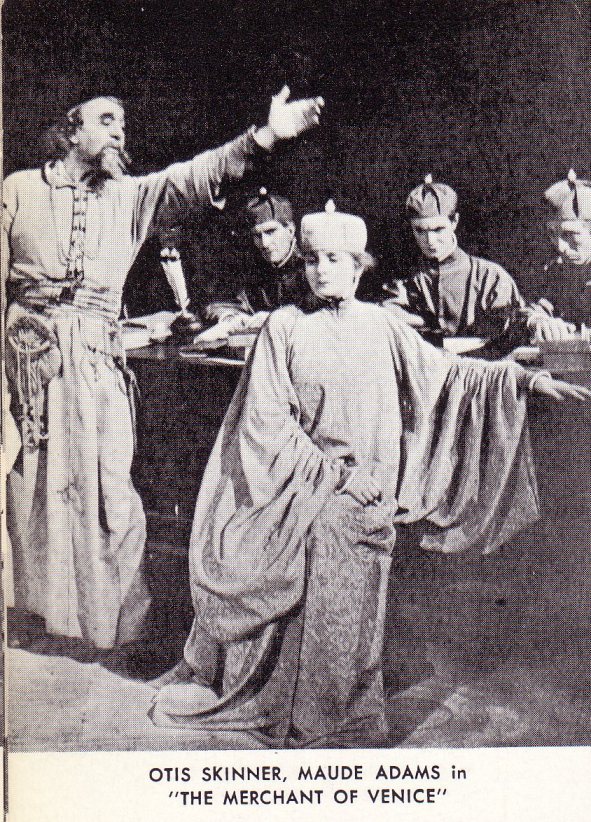
The play was performed during the winter of 1931-1932, right in the midst of the Great Depression. One reviewer wrote about what he saw during a rehearsal of the play:
"She was firm, sharp, nervous, quick, impatient, tense and terse....Now and then she tried her coquetry upon the greasiest of the electricians, and it always worked. Frail and fifty-eight, yet alert and amazingly self-sufficient."
One instant she was pointing up at the flies, another she was crouching at the footlights. She was never still. When she moved, when she gave her staccato commands between sips of tea, the spell of her came over me."
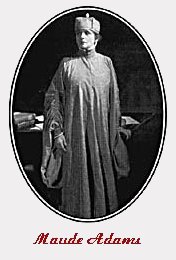
She knew what she wanted, and she gave her orders. Now she was wistful; now she was fretful; now she was tormentingly sweet. But however she did it, whatever she said, she got action."
On opening night she received 113 letters and telegrams from people in 21 states, the District of Columbia, and Canada.
In the play she appeared as the character Portia.
"There was news, as of the early thirties, of two of the theater's great ladies-Maude Adams and Maxine Elliott, both of whom had been long absent from the stage. ...And Miss Adams, resuming her career after thirteen years of inactivity, was taking to the road, taking to it fora long and arduous tour through many states, in The Merchant of Venice, with Otis Skinner as her Shylock....I feel grossly cheated in not having gazed uopon Maude Adams as she brought her enchantment to The Little Minister." (Matinee Tomorrow: Fifty Years of Our Theater by Ward Morehouse)
This was yet another of the plays where the critics did not like the play, but the audiences did. It was considered a financial success.
=====A Primer for Playgoers: An Introduction to the Understanding and Appreciation of Cinema, Stage, Television by Edward A. Wright; Prentice Hall, 1958=====
The first entrance of Maude Adams in her revival of The Merchant of Venice can never be forgotten. Even though she was past sixty, it was as if ten thousand watts of light had suddenly been turned on. True, at this age, she was not able to sustain that excitement throughout the performance. The same was true of Mrs. Fiske in her revival of Becky Sharp. To those who had not seen these great actresses in their prime, it was a revelation of what they must have been.
Reviews
There are fine qualities in Miss Adam's Portia, of sweetness and charm, of pauses and words aptly spoken that have in them some touch of the electric. The sheer competence of her acting, so well timed, so deeply calculated, so true in detail, gives a kind of pleasure. Perhaps we should not expect a miracle. Perhaps we should not expect Miss Adams to be exempt from the ordinary changes made by passing years. But somehow many of us do. It should not have been disturbing to see that Miss Adams i not immune from the processes of life, that she is no longer young and the quality of wistfulness is not the same quality at all ages. These things would probably not be so inescapable if she were playing another character than Shakespeare's Portia. The choice does not seem a very happy one. Cleveland Plain Dealer, Nov. 4, 1931
To every one who loves Maude Adams the part she has chosen for her return to the stage will be a source of dismay...Being a romantic, willowy part, Portia merely directs attention to the fact that Miss Adams is no longer young. At the age of 58 she is an endearing lady. Her features are dainty; her voice is both firm and sweet. The glint in her eyes and the tossing of her head retain the buoyancy of her spirit. ..To see her as Portia, however, is to be constantly reminded all evening that this lady's little body has grown odl with the world...For no personal high-mindedness and no delicacy of acting can supply a radiance of youth that is missing. New York Times, Nov. 1931
After a retirement of thirteen years the most loved of the ladies of our stage is still a woman to whom our hearts go out in humble adoration. New York Times, Nov. 9, 1931
Mr. Skinner sought to have the great lady make a speech. there were ten curtain calls and though she seemed to weaken, she was firm...she stood there smiling, tremulous, happy, breathless and scared-but she wouldn't speak. New York Sun, Nov. 4, 1931
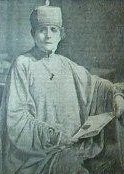
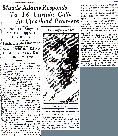 The Syracuse Herald, Nov. 4, 1931 |
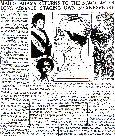 The Zanesville Signal, Nov. 8, 1931 |
 The Oakland Tribune, Nov. 4, 1931 |
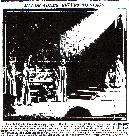 The Daily Northwestern, Nov. 5, 1931 |
 The Syracuse Herald, Nov. 13, 1931 |
 The Syracuse Herald, Nov. 13, 1931 |
The first article is not only about the play, but talks about Maude Adams inventing a lighting system for the stage.
|